Tags
Chitanda, Chitanda Eru, Fukube Satoshi, Houtarou, Ibara Mayaka, imagination, Mayaka, Mystery Case, nature, order, Oreki Houtarou, Satoshi, series, Topology
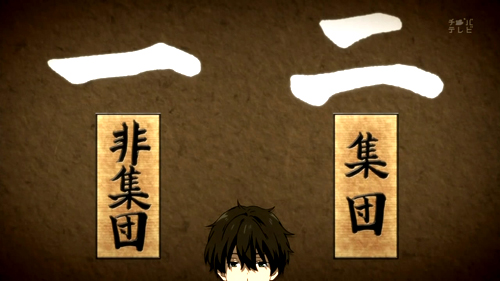
Logic will get you from A-Z
Imagination will get you everywhere.
~Albert Einstein
The inquiring mind becomes so full of imagination because curiosity hangs in anticipation to disclose every unknown whenever we talk about mystery cases. Because of this, I find that the challenge in constructing this genre is not the creation of the enigma per se but rather the structure and dimension of the cases. But most importantly, how the viewers can equally enjoy the opportunity to solve the mysteries.
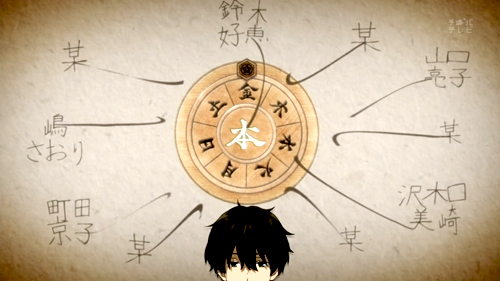
Although I don’t disagree to demand for intricacy, usually I find myself liking more when simplicity contours the mystery since oftentimes the simplest ones are the hardest to see and the trickiest to explain. If done right, it’s a pleasure to watch—not because of the mystery but because of the approach. And this is something that I’d seen in Hyouka. It tackles seemingly easy riddles yet subtly preserves the secrecy behind the plotline. The clues are also well set that I don’t feel cheated once the characters started to decipher the cases. Nature, order, and series are beautifully and believably embellished on this show.
I’m not going to deny that the mysticism and cute characters caught my attention. Little I know that I will enjoy the exquisite realism of this show. The storyline is so neat in visualising Houtarou as the vehicle to enchantment and in envisaging Chitanda as the seed of curiosity. I find balance in the relationship between these two. And it’s fascinating how Chitanda falls into Houtarou’s ploy in reality, and at the same time, how Houtarou falls into Chitanda’s charm in his imagination.
In fact, one of my favourite moments is the café scene. The ambience, the heart-shaped pendulum and other symbolisms, and the dumbfounded reaction of the male lead as he got back to reality adorably tickled the audience’s imaginations. This journey into Houtarou’s mind edifies that regardless of how far our minds magically travel, we’re still watching something natural and “grounded” to reality—which is a component of a good detective mystery show.
Further, indeed imagination will tour us anywhere but it’s undeniable that we need logic in shaping our destinations. Of course we don’t want to get lost in our own imaginations. For such reason, I commend Hyouka’s scripts and imageries. They unveil the ambiguities without spoiling the fun.
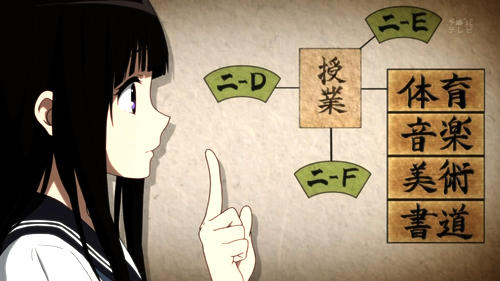
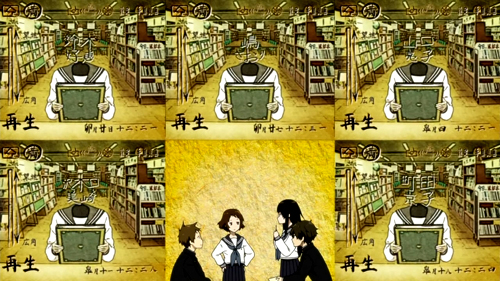
Let’s see for instance the diagrams. These stay true on how flowcharts work. I love how these brought order and flavour to Houtarou logical inductions. The wiggly lines, incessant circles, and the bordering rectangles were all playfully crafted to inventively present logic. The used of grids and binaries are also so artistically used in hinting the viewers how the clues must be perceived—with evenness and symmetry.
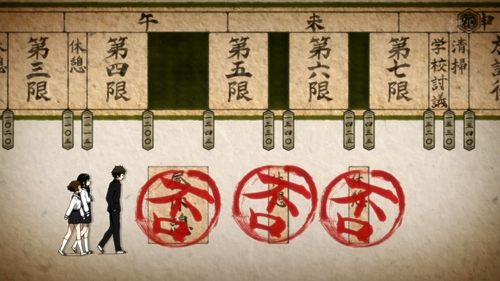
Apart from these, I find Hyouka’s illustration of linearity classy. I couldn’t help but to creatively imagine the horizontal x-axis whenever the logical deductions are being explained. Just like the infinity of an x-axis, sometimes looking for answers only leads to endless questions. But like how any equations were solved, every point must be set and mapped accordingly to gradually and surely work out the problem. And this is how I find Hyouka’s presentation of events, with fathomable sequence and series.
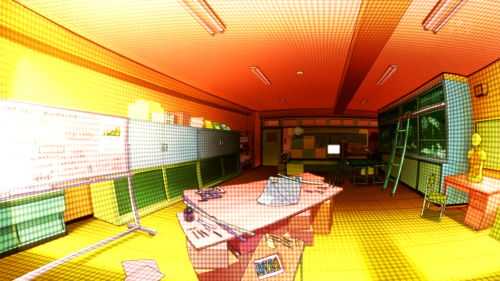
As a visual and logic fan, I truly take pleasure in how Hyouka artistically landscapes our imagination and reasoning. With anime like this, how can you not say that the use of logic and structure can be so cool and inventive? Maybe I’m praising this show too much, but whatever… as architects of our own imaginations, we certainly have different forms of appreciations. Hopefully, Hyouka will continue to deliver and become more interesting.
▬▬▬▬▬▬▬▬▬▬▬▬▬▬▬▬▬▬▬▬▬▬▬▬▬▬▬▬▬▬▬▬▬
Fun Fact:
- Topology is a branch of mathematics and can be formally defined as the study of qualitative properties of certain objects.

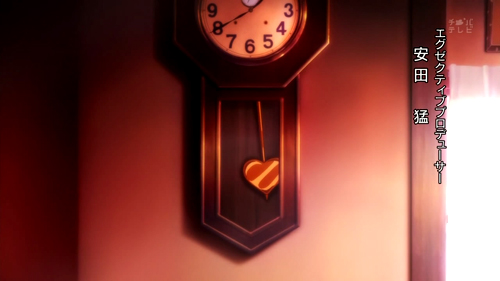
Ah, it was this creativity with how their thought processes and deductions were visualized, that is the primary reason I’m still watching this show. I haven’t really cared for the actual mysteries much to be honest, since they’re so incredibly banal–but at least the show’s going about it all in the most interesting way it can.
Still hoping for a reason to care about the characters though, which would in turn make me much more interested in their long-winded conversations/meanderings. Still need to see ep 3 though.
I think this show is getting better. I agree that it would be nice if the characters are going to be caught up in a long-winded conversation. But I remembered, episode one had some nice meanderings between Houtarous and Satoshi before the show ended. I like when Satoshi said, “mystery fights mystery” and how he caught Houtarou off guard when told him that he only delayed rejecting Chitanda.
Also, I think the reason why the characters don’t have that much conversation going on because of the main lead being minimalist and a bit anti-social. So far, everything just happens to Houtarou’s head but hopefully as he opens up, more interaction happens.
Um, I think the quote is “Logic will get you from A to B, imagination will take you anywhere.” The way you have it it sounds like imagination is going to hit me with an ICBM.
Yeah, I just corrected it. Thanks for pointing that out. ^^
I really like the aesthetics that utilize colors and typography as well as the diagrams used. I’ve also started to appreciate the blaring technique used to denote Houtarou’s distancing himself. He’s one clever fellow. I was a bit bored the first eps because of the mundane mysteries, but now things start to become bigger. Also, I had an issue with Chitanda’s hyperactivity that seems so fake- I think it toned down or I’m getting used to it.
I like the linearity and logic used, too :)
The last episode’s character that denied to chitanda-tachi too much intrusion in the class was so obviously nervous and quite rude; I thought for one moment that what he hid under the pile of papers and table was a girl… I know, I know, my mind is dirty. Can’t help it though ^ ^
The ED is the reason I gave this series a second chance. I’m shallow, but it’s ok.
I know, I know, my mind is dirty. Can’t help it though ^ ^
Haha, that’s fine… that’s the works of imagination. ^^
I’m glad you like you’re enjoying Hyouka. I really like it reminded me some of my math courses specifically the topic in topology. It’s easy to understand theories if you can relate it into something.
The ED is the reason I gave this series a second chance. I’m shallow, but it’s ok.
I’m also shallow like that. The ED is really nice especially it has a bit of yuri tones. Unfortunately, it’s not happening in the series.
Pingback: YumeState :: Anime Blog » Hyouka is Hyoukay, I Guess
This is why I like the visuals in Hyouka so much. Besides looking pretty it gives us so much to explore with our imagination. We have the opportunity to pick up little visual details that may or may not even relate to the story at hand. I often found my mind wandering during the diagram scenes away from the subtitles and onto the various imagery presented. And, of course, the more you pick up, the the greater chance you have in reaching the conclusion of the mystery. Which is nice when compared to other “mystery” shows that are impossible to solve by the audience.
I couldn’t agree with you more. Aside from the cool visuals of this show, the mysteries are also “solvable”. The viewer’s clues are more or less equal to the character’s knowledge, which is I rarely happens to some other “mystery” cases like you said.
Pingback: Notes on Hyouka as an Exploration of Detective Fiction: A Database Post | The Untold Story of Altair & Vega
Reblogged this on compass on my field trip.
Pingback: Hyouka is Hyoukay, I Guess « Cholisose!
Pingback: A Database of Curiosities: A Hyouka Literature Review | Fantastic Memes
Pingback: Altair & Vega » Notes on Hyouka as an Exploration of Detective Fiction: A Database Post